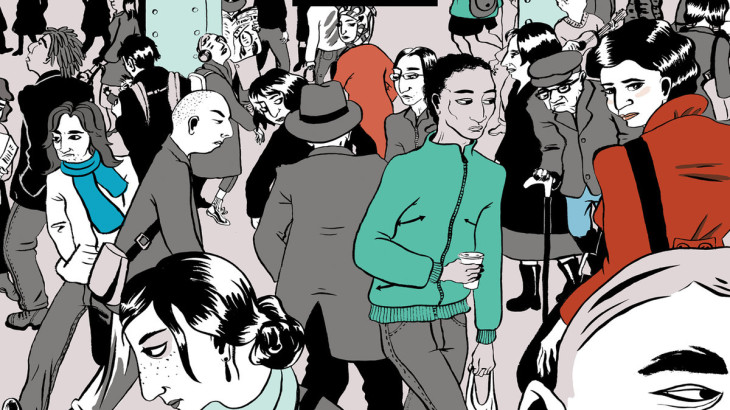Nostalgia, that undeniable part of the human condition that brings us a fourth reboot of Spiderman and new Roseanne, gets a bad rap these days. Sure, the results of modern consumerist-driven nostalgia can be as irritating as they are boring, but there’s no point in pretending that revisiting the past can’t have value if done right. On Goths, the Mountain Goats (tMG)’s band leader John Darnielle revisits, in that hyper-visceral way he was born to do, a very specific setting from his past: the ‘80s goth scene boom in Southern California.
A less gifted lyricist might have plumbed the dark teenage angst for snarling “insights” and yearning for a passing moment in time; instead, Darnielle recounts with varying distance, far more concerned with what it actually means for a subculture to appear and disappear. Gothic idiosyncrasies are recalled with tender affection and humour, which is unsurprising, considering Darnielle was a part of it himself – though he’s quick to assert he wasn’t a “24-hour” goth, and that in his small Southern California town the turn of phrase was “death rock”.
Before their recent visit for Bluesfest and a sold-out headline tour this year, tMG hadn’t landed on Australian soil since touring their album Transcendental Youth in 2012. Goths, for its part, feels in many ways like a natural progression from that album and its successor Beat The Champ: each leans heavily on brass instrumentation, something relatively unexplored by tMG previously – and each is, to put it crudely, a “concept album”. But, like Goths, Transcendental Youth isn’t just about Amy Winehouse’s suicide, and Beat The Champ isn’t just about professional wrestling. These are frameworks Darnielle uses to explore violence, self-hatred, loss, pride, ambition, failure, and he has never done it with this much finesse. His work, as always, seeks the universal truths to be found in the minute details of lives that may seem alien or “other”, ultimately positing that there are no real meaningful differences in humankind.
The cleverest song on Goths is undeniably Abandoned Flesh, which documents the bizarre flash-in-the-pan career of ’80s KROQ band Gene Loves Jezebel in heartwarming yet sobering detail, all swirling woodwinds and biting lyricism. It’s a vulnerable meditation on life, creativity, and capitalism that will resonate with anyone who has ever uttered some version of the line “But for the most part, however big that chorused bass may throb / You and me, and all of us, are going to have to find a job“.
On The Grey Flame And The Silver Flame Attunement, Darnielle parades his gift for inflating simple language with so much weight that the air feels noticeably thicker for it. His voice, too, has attained a new kind of smoothness; Darnielle’s songwriting has never suffered for his nasal twangs and tinny timbre, but this newfound sweetness is a welcome development, allowing for a different kind of vulnerability to pour forth.
Flippant sonic diversity is very much Darnielle’s wheelhouse, so despite their traditional importance in tMG’s discography, the elimination of guitars on their sixteenth album is not entirely shocking, nor the embracing of woodwinds.
The newer sounds are used to great effect; the melodic additions coil beautifully around erstwhile polished vocals, and the ramshackle urgency we’re accustomed to is now more finely-tuned and urbane. Often it’s surprisingly bouncy, evoking elements of funk and pop (We Do It Different On The West Coast, Rain In Soho). Even when applied to outwardly solemn tracks (Wear Black) there’s a playfulness that consistently throws up roadblocks for those who take nostalgia too seriously.
Goths is out now via Remote Control Records in Australia.
Read more: FLASHBACK FRIDAY: The Mountain Goats, The Sunset Tree
Image: Bandcamp

